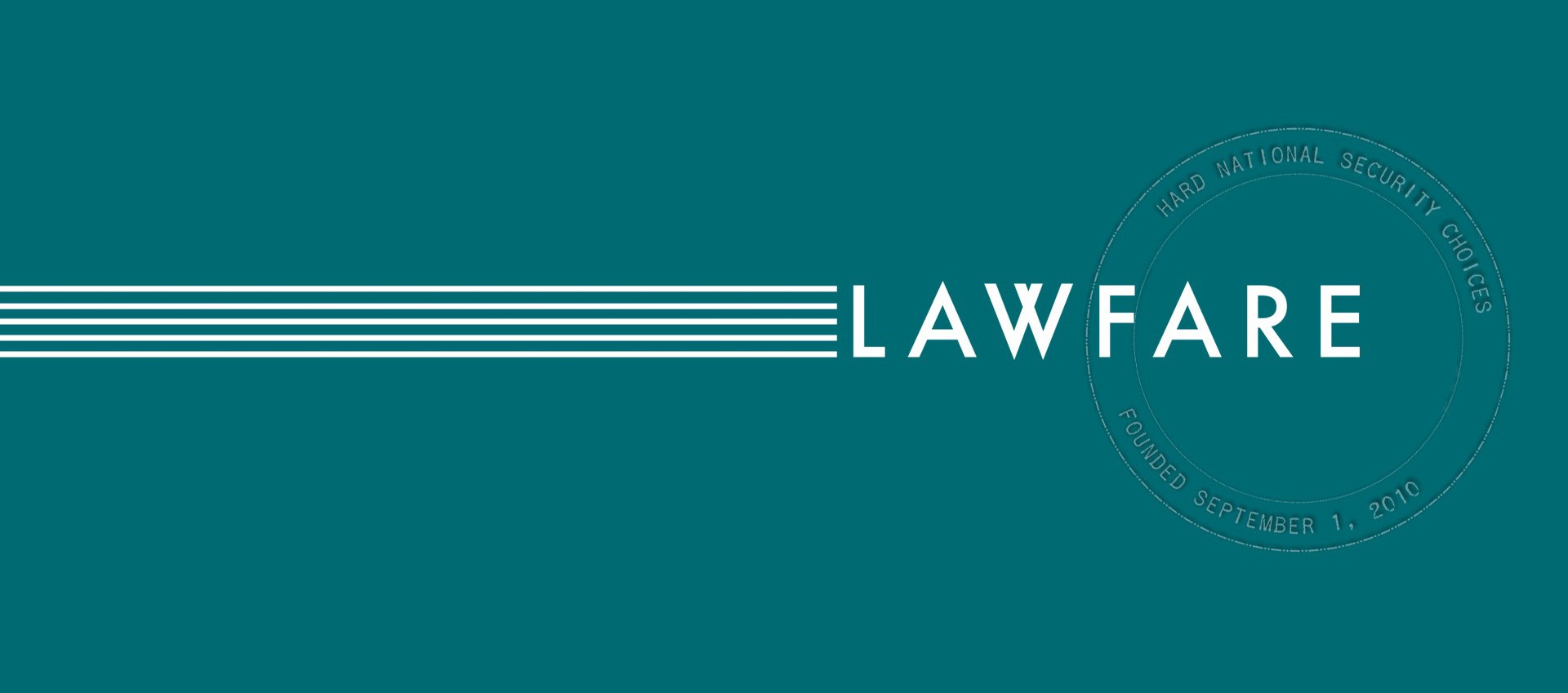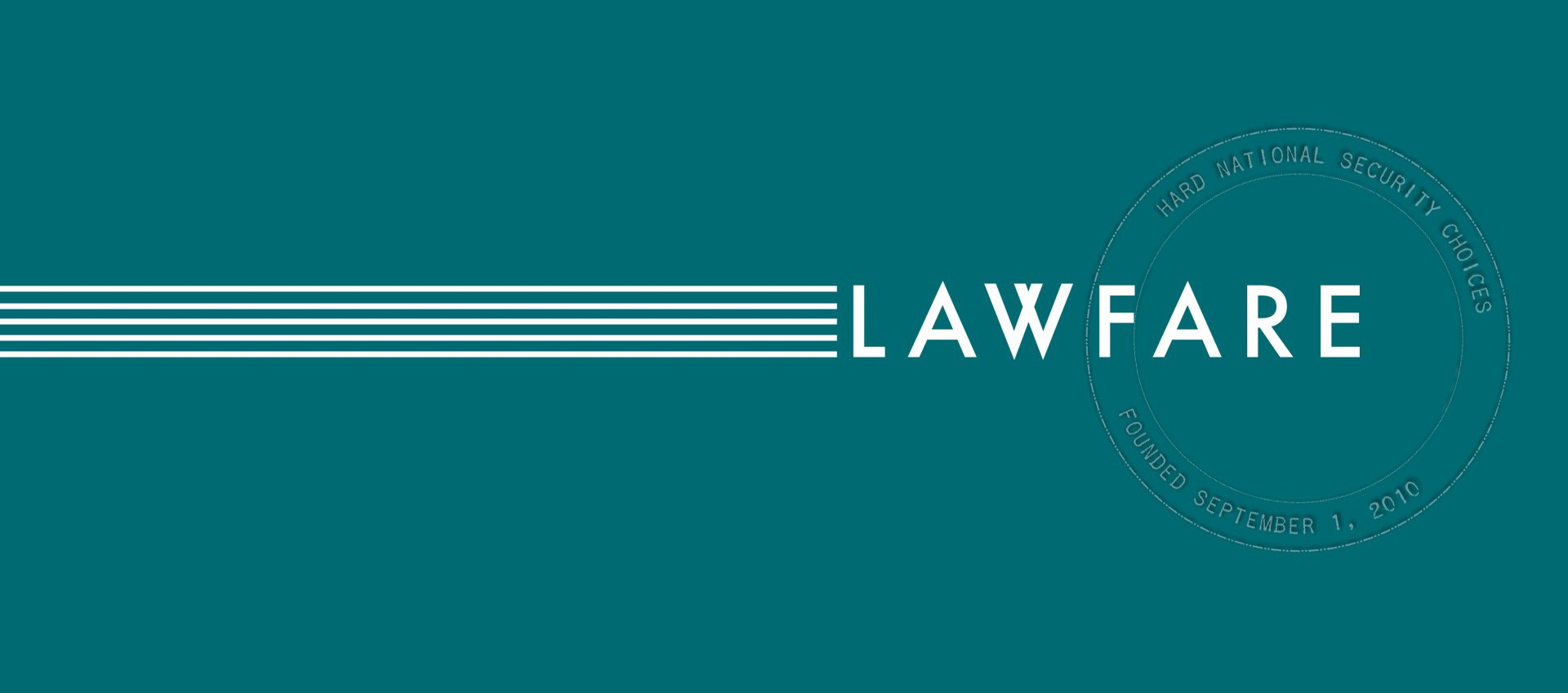The Week That Was: All of Lawfare in One Post

Published by The Lawfare Institute
in Cooperation With

Chimène Keitner unpacked the International Court of Justice’s recent decision in South Africa’s case against Israel, alleging that Israel violated the Genocide Convention in Gaza. She detailed what the court ordered of Israel, the judges’ differing opinions, and what to expect in the case’s future.
Mark Lattimer detailed the six provisional measures ordered by the International Court of Justice in South Africa’s case against Israel. He also discussed the measures the court elected not to order, including an immediate suspension of military operations.
Hyemin Han shared the International Court of Justice’s order issuing provisional measures in South Africa v. Israel.
Roger Parloff argued that both Justice Antonin Scalia and Alexander Hamilton believed that the president was an “officer of the United States,” a distinction that has become central to the debate over whether former President Trump is disqualified from holding the office of the presidency under Section 3 of the 14th Amendment.
On the Lawfare Podcast, Benjamin Wittes sat down with Quinta Jurecic and Roger Parloff to discuss where Section 3 disqualification litigation stands across the country and at the Supreme Court, the lack of action from the D.C. Circuit Court of Appeals on Trump's presidential immunity defense, and more.
In Season 2, Episode 2 of The Aftermath: Lawyers for the Coup, host Natalie Orpett, with interviews from Kyle Cheney and Greg Jacob, counsel to Vice President Pence, told the story of the legal theory that inspired the insurrection, and explained how (if at all) John Eastman, the architect of the “fake electors scheme,” and others like him have been held to account.
On Lawfare Live, Benjamin Wittes sat down with Bower and Parloff for this week’s episode of “Trump’s Trials and Tribulations.” If you couldn't attend the live event, the recording has been made available on Lawfare’s YouTube channel or over the weekend on theLawfare Podcast feed.
Jack Goldsmith and Matt Gluck outlined the legal arguments the Biden administration could adopt to convince Congress to authorize its use of military force against Houthi rebels in Yemen before the War Power Resolution deadline in April.
On the Lawfare Podcast, Gluck spoke with Matthew Waxman and Michael Ramsey about their new law review article on the history of war power delegations from the Founding era to the present, what these findings might mean if Congress takes a more assertive role in the war powers context, and more.
Matt Gluck shared President Joe Biden’s second 48-Hour War Powers Resolution report notifying Congress of the second round of joint U.S.-U.K. strikes against Houthis in Yemen
Scott R. Anderson outlined his recommendations for Congress to mitigate the policy and legal risks associated with the Rebuilding Economic Prosperity and Opportunity for Ukrainians Act (REPO for Ukrainians Act), which grants the president the ability to seize frozen Russian assets and provide them to Ukraine as compensation for Russia’s brutal and unlawful war of aggression.
Jonathan Cedarbaum and Matt Gluck detailed the new cyber provisions included in the 2024 National Defense Authorization Act, including a new grant of authority for military cyber operations against Mexican criminal organizations.
In the first paper for Lawfare’s new Security By Design Paper Series, Jim Dempsey argued for the incorporation of a rules-based floor and a process-based safe harbor to improve standards for software liability, minimize litigation costs, and boost security.
On the Lawfare Podcast, Stephanie Pell sat down with Shoba Pillay and Jennifer Lee to talk about the details and significance of the cybersecurity-related enforcement action filed by the U.S. Security and Exchange Commission (SEC) against the SolarWinds corporation in October 2023. They discussed the cybersecurity and national security implications of the SolarWinds hack, what the SolarWinds enforcement action suggests about the SEC’s expectations for disclosure obligations of companies, and more.
On the Lawfare Podcast, Stephanie Pell sat down with Jim Dempsey, a senior policy adviser at the Stanford Cyber Policy Center, to discuss his proposal for a software liability regime. They talked about the problem his paper is seeking to solve, what existing legal theories of liability can offer a software liability regime,where those theories fall short, and more.
Paul Rosenzweig detailed the attack last Friday by Russian hacking group Nobelium against Microsoft’s top executives. He reviewed Nobelium’s history of cyberattacks against Microsoft and discussed how Microsoft’s disclosure of the attack to the Securities and Exchange Commission (SEC) demonstrates the impact of the SEC’s new disclosure rules.
In this week’s installment of Lawfare’s Foreign Policy Essay series, Lauren Kahn evaluated the Political Declaration on the Responsible Military Use of Artificial Intelligence and Autonomy which lays out a series of principles for the military application of artificial intelligence (AI).
Darren Linvill and Patrick Warren explained how Russian disinformation campaigns are being supercharged by new technologies such as AI.
Paul M. Barrett reviewed Wall Street Journal reporter Jeff Horwitz’s new book “Broken Code: Inside Facebook and the Fight to Expose Its Harmful Secrets.” Barrett found that Horwitz’s rigorous reporting and assessment of Facebook’s failed business model was convincing, though he also identified that Horwitz failed to address Facebook’s weakness in content moderation.
In the latest edition of the Seriously Risky Business cybersecurity newsletter, Tom Uren discussed how the Australian, U.S. and U.K governments are cracking down on cybercrime by sanctioning individual cybercriminals, Microsoft’s recent cyberattack by cybercriminal group Midnight Blizzard, and more.
On the Lawfare Podcast, Featuring live audio from the Knight Foundation's INFORMED conference in Miami, Florida, Benjamin Wittes sat down with Kenneth L. Wainstein, Jameel Jaffer, and Quinta Jurecic to discuss government surveillance of open source social media.
On the Lawfare Podcast, Anna Hickey sat down with Heather Cox Richardson to discuss her new book “Democracy Awakening: Notes on the State of America.” They discussed the state of American democracy today, the historical context we should use to understand the current threats to democracy, and more.
On Rational Security, Anderson was joined for a Bizarro-world episode with guests Molly Reynolds (back for a second episode in a row!) and Anna Bower. They talked over some of the week’s big stories, including the fate of key national security legislation and the dysfunctional dynamic between the two chambers of Congress, the endangerment of Fulton Co. Prosecutor Fani Willis’s case against former President Trump from rumors of an affair, and more.
And on this week’s Chatter, Scott R. Anderson spoke with Kelly Weinersmith and Zach Weinersmith about their book “A City on Mars,” what role they think space exploration and settlement should play in humanity’s future, and more. They argue that despite NASA and Elon Musk’s rejuvenated interest in space exploration, it’s actually not worth it to master outer space.
And that was the week that was.



